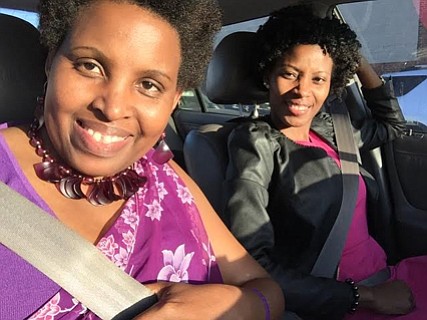BALTIMORE — Eugenie Mukeshimana was a young adult and eight months pregnant when the genocide began in Rwanda in 1994.
She gave birth while hiding from extremist Hutu genocidaires and, at the end of the genocide, the widow was forced to rebuild her life, finding solace in working with communities that have been divided and disintegrated as a result of the dastardly massacre waging in central/eastern Africa.
Last month, Mukeshimana traveled to the nation’s capital to participate in the Refugee Congress, an advocacy and advisory organization comprised of refugees, asylum seekers and stateless individuals from each of the 50 United States and the District of Columbia.
Their mission is to promote the well-being, integration, and dignity of all refugees, asylum seekers and stateless individuals in the U.S. and beyond by bringing their voices and experiences to inform decision makers on domestic and international issues and policies that affect those groups.
“I have been raising awareness about conflicts that cause people to leave home in search for a safer place to rebuild their lives,” Mukeshimana said. “I use my voice as a survivor of one of the worst conflicts to educate students and teachers, policy makers both at the UN and U.S. lawmakers, and the general public. The hope is that they would put pressure on their representative to do more to help those in need as well as reach out to others in their community to continue the support for humanitarian programs that help refugees around the world,” she said.
Mukeshimana, who settled in Baltimore, has even spoken to cadets at West Point Military Academy about gender risks in armed conflicts and she’s also worked with legal counsels and other professionals to assist individuals who are in the process of adjusting their immigration status.
“I provide social and emotional support, language and cultural integration guidance to newcomers. Many have gone through unimaginable pain,” she said. “Now that they feel safe here, they often are in a better place to deal with feeling and pains that they have been suppressing and pushing aside for so long,” Mukeshimana said, adding that she also helps to organize events like retreats to strengthen the sense of community among survivors and use those gatherings to provide training for critical skills.
“One of such retreats was held two years ago at Harvard Law School, and brought together over 40 genocide survivors,” she said.
Mukeshimana, emigrated to the United States in 2001 to pursue a degree in social work at the College of St. Rose in Albany, New York. She soon noticed that her classmates and teachers had little to no knowledge about the tragedy she had personally suffered seven years earlier, which inspired her to embark on a new mission to educate students, teachers, and other community groups about the crime of genocide.
After graduating, Mukeshimana worked with homeless families in New York and New Jersey, helping them to regain housing stability and jumpstart their lives.
In response to the increased demand for assistance by fellow genocide survivors emigrated to the United States with no support system to help them address the unique challenges they faced coming to America, Mukeshimana founded the Genocide Survivor’s Support Network. The charitable organization’s mission is to help genocide survivors rebuild their lives and educate communities about genocide.
“Sometimes, under the circumstances of heavy grief and pain, you forget the normalcy of life. It’s not normal to dig up mass graves and attend funerals every weekend like we did in Rwanda in the years that followed the genocide,” she said. “Every refugee carries scars of the horrors they’ve experienced. Some are visible, others are invisible. Despite this burden, when given a chance, they try to carry on and make life better for themselves and their children.
“I want people to remember that refugees are people too. Like everybody else, they too have dreams, skills, are faithful, and want to live a peaceful life. They share in our cultural values such as quality education, hard work, and perseverance,” she continued.
“They may not get off the plane loaded with skills, but are fast learners and will make it here if we give them a chance. After all, they have been tested in life in ways that words can’t even describe and yet, they still believe in humanity and have not given up on living. How can we give up on them?”
